On Saturday, November 7, the US woke up to find President-elect Joe Biden had narrowly won Nevada and Pennsylvania, making him the winner of the 2020 General Election. Though not yet official, the Biden-Harris presidential victory was called by various news agencies including Associated Press, CNN, and Fox.
Seattle, like other cities across the country, woke up with excitement. People celebrated in their homes, in the middle of the streets, and from their cars.
On Saturday afternoon, a march and rally organized by Black Action Coalition (BAC) alongside other groups like Radical Women Seattle and Got Green, according to the Facebook event page, attracted many to turn out to hold elected officials “accountable to people, not profit.”
“We demand that Every Vote gets counted,” says the event page on Facebook, “and to remind our constituents that our work continues to protect every person no matter who wins. Say it with us, Black Lives Matter.”
Organizers led hundreds of protestors holding up signs related to voting, democracy, and Black Lives Matter through Downtown Seattle.
The atmosphere during the event was uplifting as many joyfully cheered on the Biden-Harris victory, but also reiterated the necessity to continue protesting and advocating for change no matter who is in office.
Much of the determination seen throughout the summer seemed to persist on Saturday. If anything, a revival of energy was present after crowd numbers dwindled significantly throughout the summer.
Intersectionality was emphasized throughout the march as the crowd stopped at the William Kenzo Nakamura United States Court House to address judge’s and courts’ significant roles in immigrant deportations and relocation to detention centers.
Irene Torres, who held up a Puerto Rican resistance flag throughout the march, finds it important for resurging civil rights movements in the area to reflect on and “embrace Puerto Rico’s history.” She hopes the flag can at least spark curiosity.
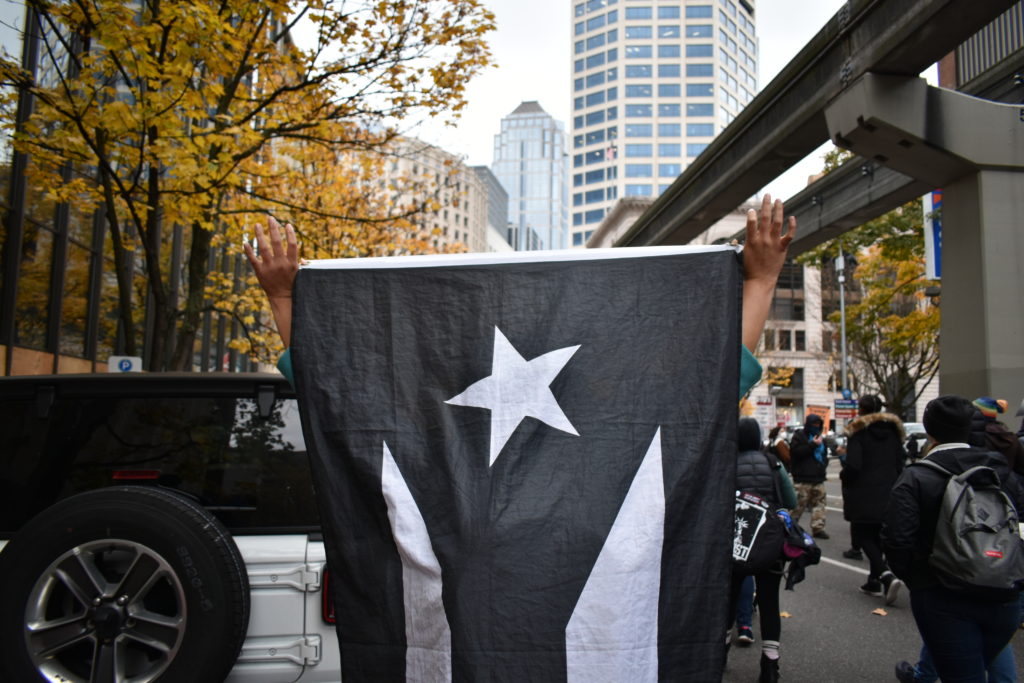
“Many people do not know that Puerto Rico is the oldest colony in the world, and currently we have one of the highest military concentrations in the U.S.,” says Torres. “I hope demands get met across the U.S. I hope that people can learn from their mistakes when it comes to their colonial mentality, or at least acknowledge it.”
Uriea Donovan, another protestor, brought his son with him to the march who sat on his shoulders to oversee the crowd. Donavon says it’s important to him to bring his son around “black people coming together, doing things that are positive, living life, and not being criminals.”
Donavon’s son doesn’t live full time with his dad but in Monroe, where 80% of the population is white, and 3.3% is Black according to U.S. Census estimates. The WA Department of Corrections reports that Monroe Correctional Complex imprisons 2,421 inmates, 19.9% of whom are Black.
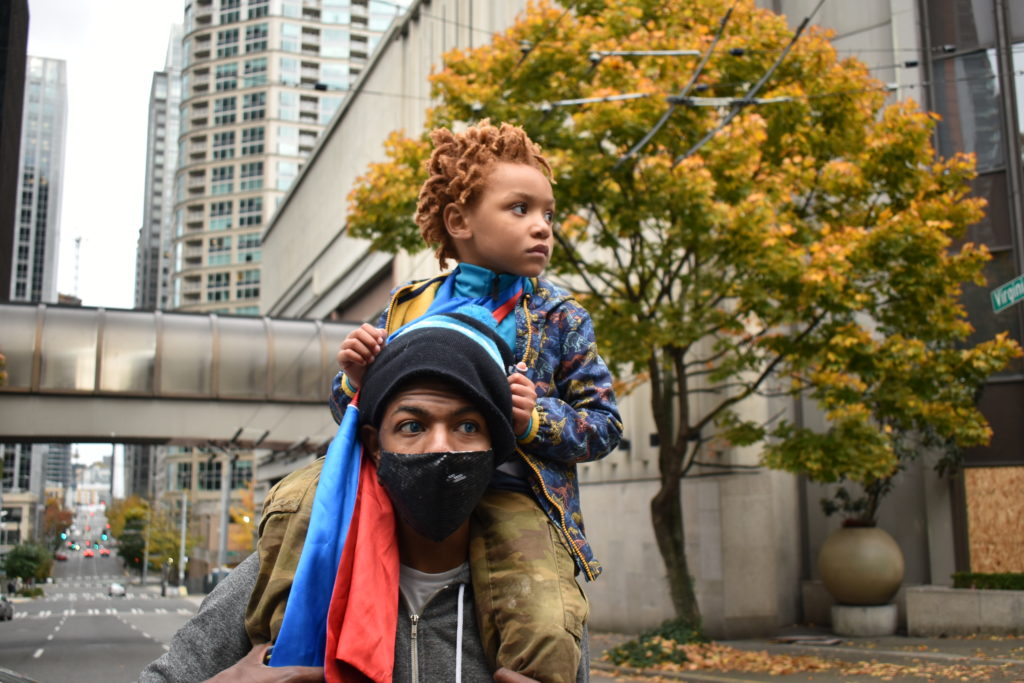
“It’s important he sees positivity amongst the Black community,” says Donavon of his son, “because he’s not going to see that in his community that he lives in full-time … the community there is not made up of Black people. Black people who are there are in the prison because that’s where the prison is.”
When asked about his hopes for his son in the upcoming four years during Biden’s presidency, Donovan said he hoped “he can feel comfortable being who he is, and not feel like he has to be a certain type of person because of the color of his skin.”
The crowd later concluded the event at City Hall, after speakers addressed the continued fight to protect, defend, and attain rights for BIPOC and marginalized communities.
Kaitie, who marches with the Morning March and is a notable speaker at many protests in the area, says Saturday brought a “new sense of refreshment.”
“We accomplished getting Trump out of there, but other than that, it doesn’t really matter who’s in there,” says Kaitie. “It works as a well-oiled machine of tyranny and oppression.”
She notes that “people are still going to be dying from systemic racism.”
Trae, an organizer with BAC, says Biden’s win felt like both a win and a loss.
“Obviously we are happy that Trump is out of office,” said Trae. “However, we have career politicians that have heavily invested in the over-policing of the black communities. So, to us, to really require change we need really radical thinkers. Kamala and Joe are not radical thinkers.”
She says it’s important and essential to understand that.
“We don’t want people to think that because Joe is in office that it’s a time to give up,” said Trae, “or a time to feel that everything’s okay when it’s not.”
Trae believes protestors and the civil rights movements have to try even harder, to “let them know we will not be silent just because they are in office. Our fears are not going away just because they’re in office.”
At the same time, hundreds of celebrators, without a specific focus on Black Lives Matter, gathered on Capitol Hill in the former CHOP area to praise Biden’s presidential win.
Sheila Michaelson, geared up in Biden merch, is among them.
“I literally can’t put it into words,” says Michaelson. “When I got news that we had a chance, I literally sobbed.”
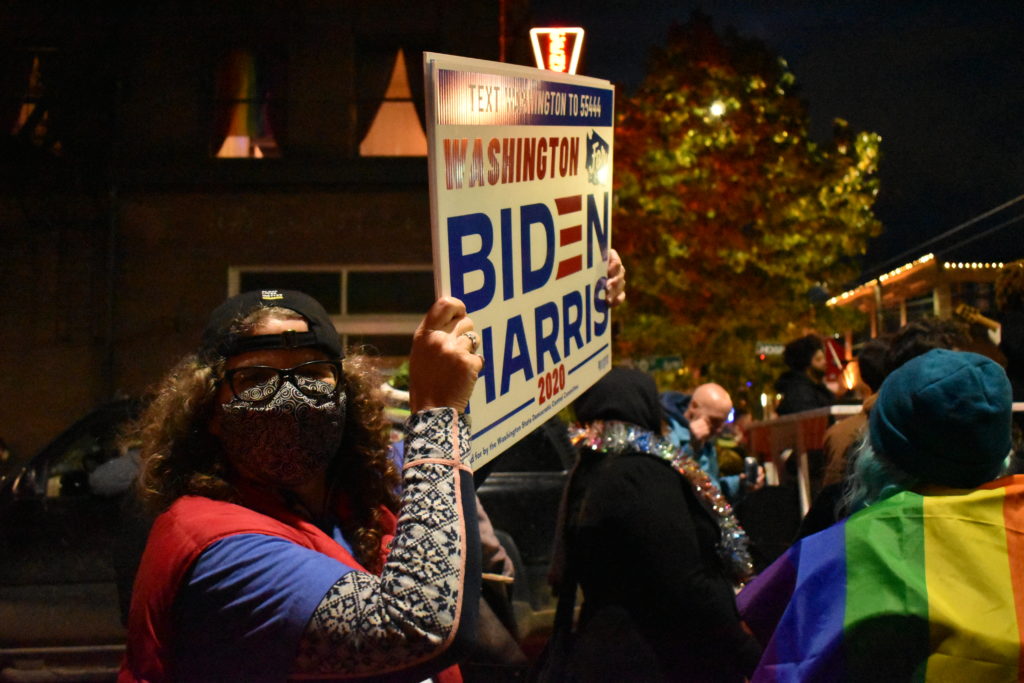
She says she hopes the newly elected administration will do “the things they need to do” which she described to be “funding education, funding mental health, funding people, and stop funding corruption.” Michaelson, like others, adds that Black Lives Matters needs to keep moving.
While the Marshall Law Band, which prominently performed during CHOP on 12th and Pine, came to play music and accompany celebrators, the sky darkened but the mood of celebrators remained inspired and hopeful.
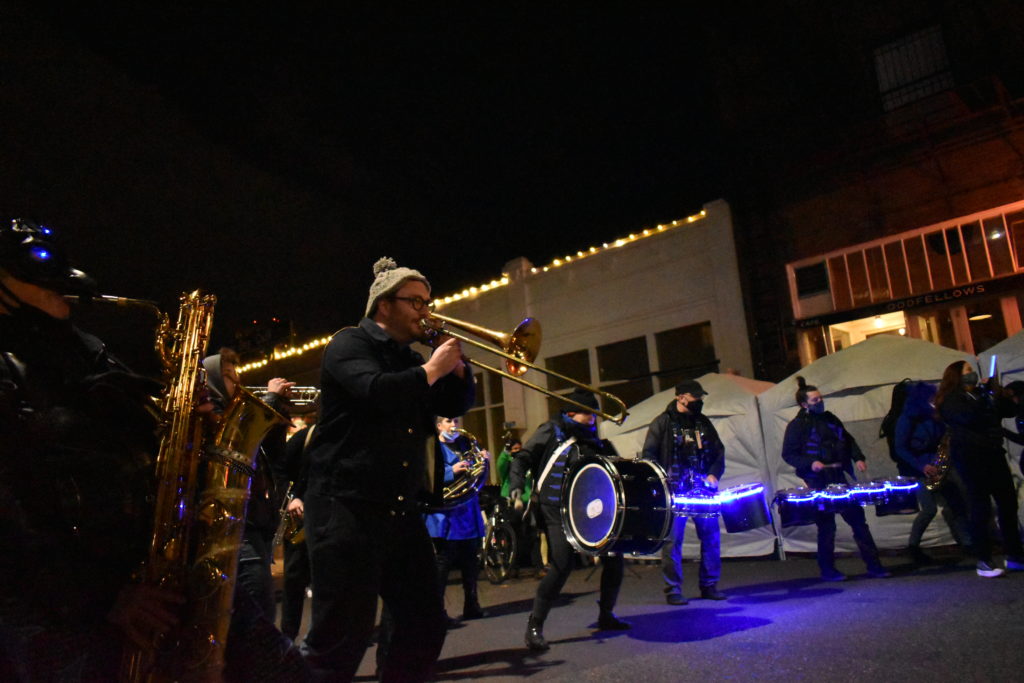
Nathan Phillips, who was found dancing with a bright smile, says Biden’s win is “a referendum on Trump, a referendum on love versus hate.”
“All the serotonin that’s been in my brain feels like it’s been released after four years. I can’t stop smiling and giggling and dancing,” says Phillips. “It [the Biden-Harris win] says that we are ready, it says that maybe we can deal with some of the racial inequity in our country. Maybe we can actually start coming to terms with it and making change.”
Daniel Gregory, who risked his life to protect protestors by trying to halt a vehicle driving towards a crowd on 11th and Pine in June, also joined in on the festivities.
Gregory was shot by the man in the car, and told King5 he “grabbed the wheel to slow down the vehicle, and punched the driver.”
He tells the Collegian that in comparison to that moment in June his smile feels genuine.
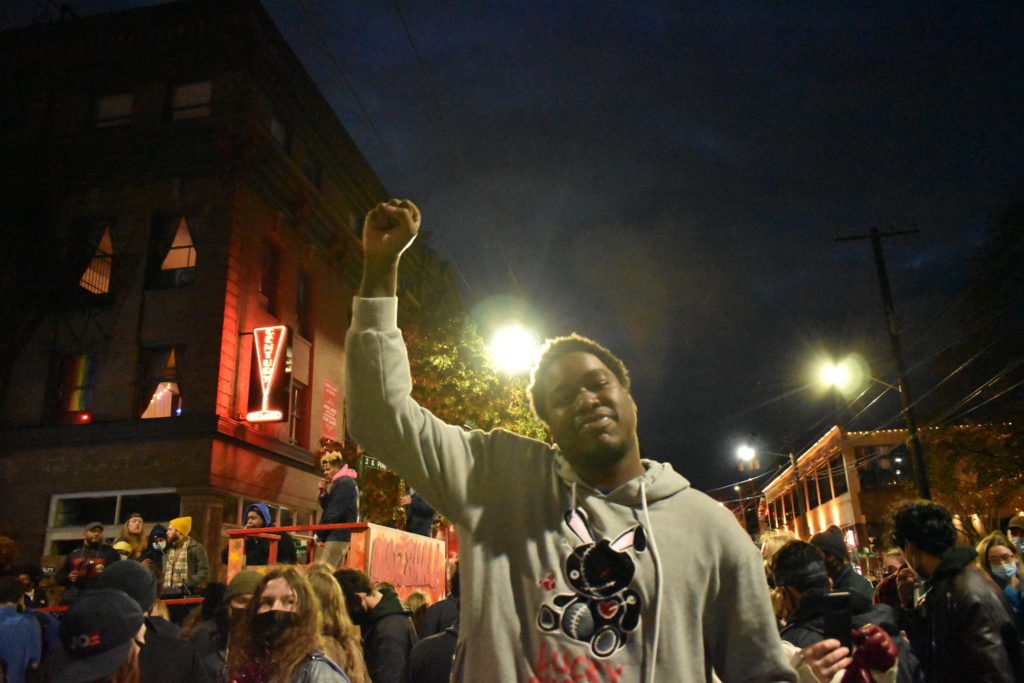
“It feels authentic, it feels real — my smile is real,” said Gregory. “I was happy to be alive, but my smile wasn’t authentic, my smile is authentic now. It’s real, I’m happy.”
Gregory says he doesn’t agree with politics but he agrees with people coming together instead. He hopes to see more unity in the next four years.
Organizers from the Every Day March also visited the celebration, making a comment to the crowd about what came next.
“Biden is no fucking savior, and neither is Kamala Harris,” one of the organizers told the crowd. “It’s so awesome you are able to come out here and party, but please put the work in because the work is not done.”
Leader of the Marshall Law Band, Marshall Hugh, preluded a new track from the band’s 12th and Pine album, a name inspired by the CHOP and Seattle’s Black Lives Matter movement, with inspirational words to the crowd.
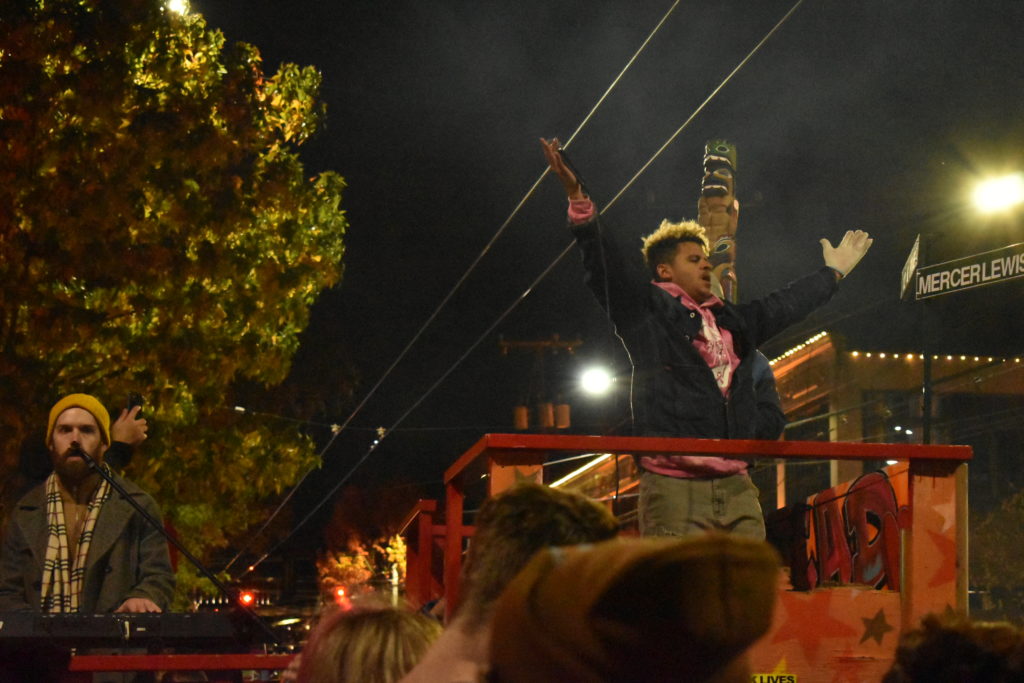
“Whatever you can lend, whatever your passion is, don’t begrudge other protestors, other activists for the way they get down,” said Hugh. “I hope you find refinement in your journey, but who am I to stifle your creativity in this battle against the system. So please have patience with your fellow comrade, allow them to grow on their journey because we all have our own journey.”
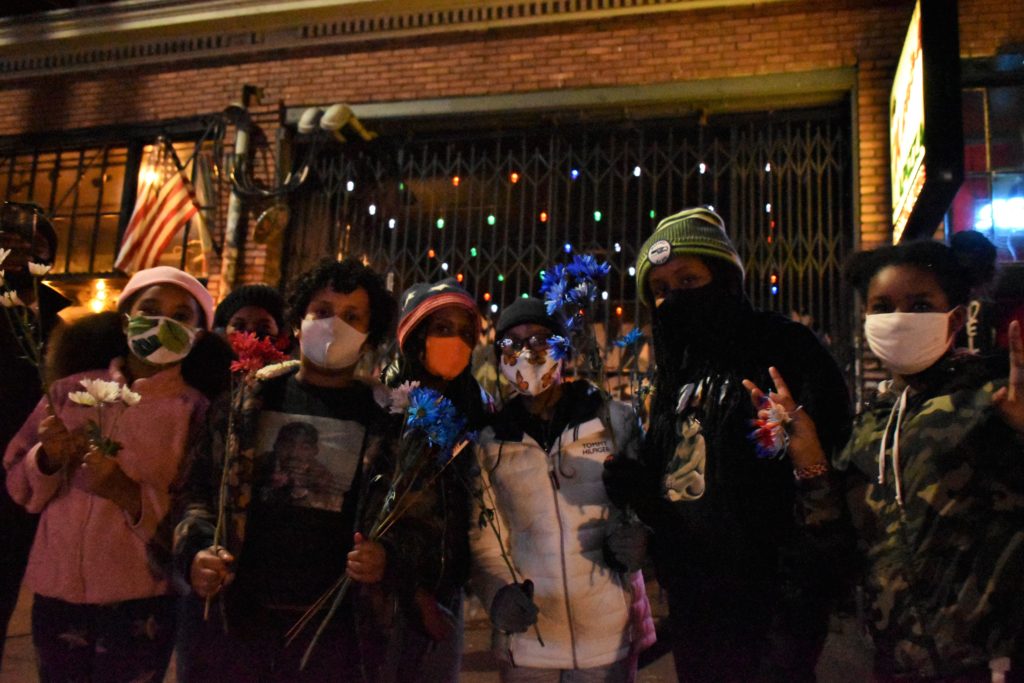

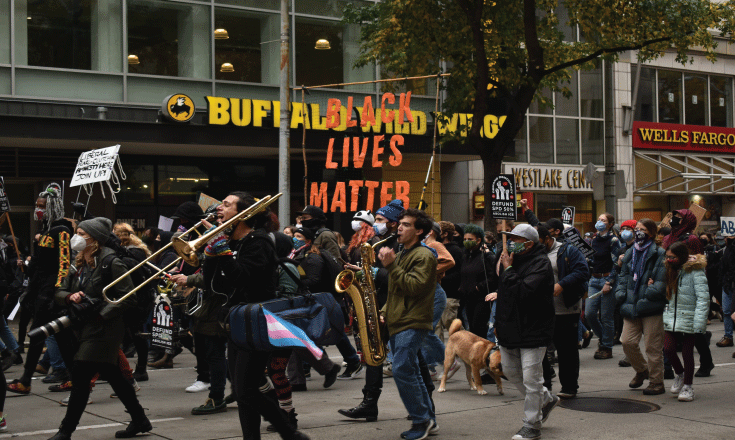





Be First to Comment